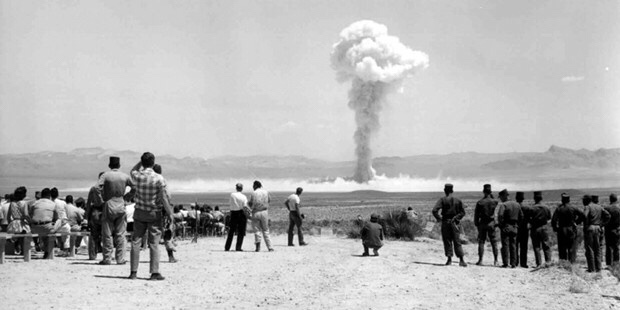 Australia still ‘totally radioactive’ 60 years after Hiroshima-scale nuclear tests
Australia still ‘totally radioactive’ 60 years after Hiroshima-scale nuclear testsDecember 12, 20178:10pm
AUSTRALIA is a “totally radioactive” country riddled with hidden cancers and birth defects that risks becoming worse for future generations if the government does not limit uranium mining and the use of nuclear weapons.
That’s according to nuclear test survivor Sue Coleman-Haseldine, 67, who was raised in the shadow of British nuclear tests carried out at Emu Field and Maralinga in the 1950s and 1960s, where bombs on the same scale as Hiroshima were detonated and led to fallout known as “black mist”.
The Kokatha woman grew up in a community where people were blinded, killed or made sick from radiation poisoning with fertility problems and birth defects now common in the district.
The devastating effects she’s witnessed first-hand drove her to advocate for an end to weapons and mining on an international stage.
“Australia is totally radioactive,” she told news.com.au. “There’re so many deaths from different cancers. Myself and my granddaughter don’t have thyroids as they’ve been removed. The defects in newborn babies are heartbreaking.
“If you ask one of the young ones [in her South Australian community], ‘What do you think you’ll die from?’ they’ll say ‘cancer’ because that’s what everyone else dies from. The government is doing nothing at all. They don’t want to know.
“As people of Australia, we all need to join forces — everybody: black, white and brindle — and shame the government to sign this treaty to ban nuclear weapons.”
Nuclear tests carried out at Maralinga have had a devastating health impact on communities still in the area.Source:Supplied
The stark warning has helped capture global attention, with the Australian International Campaign to Abolish Nuclear Weapons (ICAN) recently scooping the Nobel Peace Prize in Oslo for their efforts. Coleman-Haseldine said it was “absolutely wonderful” to travel with the group of around 100 non-governmental organisations and gain global recognition for those sent like “lambs to the slaughter” to work on nuclear testing sites during British operations in Australia.
“People hadn’t even heard of Maralinga, which was absolutely mind-boggling,” she said. “We’ve been poisoned once, no more. I’ve lived under the shadow of Maralinga all my life. I don’t want the future generation living under a toxic waste dump that they wouldn’t even see coming.”
‘BLACK MIST’ DESCENDS
The British government carried out 12 nuclear tests, including seven at Maralinga, two at Emu Field, both of which are in South Australia, and three at Monte Bello in Western Australia, over the 1950s and 1960s.
The first “operation buffalo” at Maralinga involved a 15 kilotonne atomic device that was the same strength as Hiroshima, to test the “red beard” tactical weapon. It led to radioactive clouds being sent towards the east coast with subsequent clean-up operations in 1964 and 1967 only making the contamination worse according to Dr Liz Tynan, who wrote a book about the Maralinga story called Atomic Thunder.
More than 60 years on, the Australian-founded group won the world’s top peace prize despite problems that persist in Australia. The win was based on ICAN’s work persuading the UN to adopt a Treaty on the Prohibition of Nuclear Weapons which provides a “pathway” to a nuclear-free world.
ICAN’s Asia-Pacific director Tim Wright has been involved with the campaign since its inception and Australia remains a “big part of the problem” when it comes to nuclear weapons. While the country does not have its own, it is protected under the US “nuclear umbrella” that would mean the US retaliating with nuclear weapons if Australia was attacked.
“We believe that Australia should take a principled stand against them just as it’s done for biological, chemical weapons, cluster bombs and landmines,” he said, adding that “you can’t have 15,000 nuclear weapons in the world” and avoid them being used.
Wright said the team is thrilled to have “shined a spotlight” on the issue that is more pertinent now than at any time since the Cold War given rising rhetoric and hair-trigger tempers of President Trump and North Korean leader Kim Jong-un.
“In many ways the world is more dangerous today than it was back then. The question for the Australian public is, ‘Do you feel safer knowing that President Trump has his finger on the trigger for 7000 nuclear weapons or does that make you feel less safe?’ I think most people would conclude it makes them feel less safe.”
His comments echo those made by ICAN’s executive director Beatrice Fihn upon accepting the award, who said “the deaths of millions may be one tiny tantrum away”.
“We have a choice, the end of nuclear weapons or the end of us,” she said, adding that a “moment of panic” could lead to “destruction of cities and the deaths of millions of civilians”.
ICAN is working to encourage countries to ratify the UN Treaty on the Prohibition of Nuclear Weapons adopted in July. However it faces significant opposition from nuclear states including the US, UK and France.
victoria.craw@news.com.au
Australia has a hidden and devastating history of nuclear testing that has still not been formally rectified, campaigners say. Picture: from Collisions, by Australian artist Lynette Wallworth, about the Maralinga testsSource:Supplied
No comments:
Post a Comment